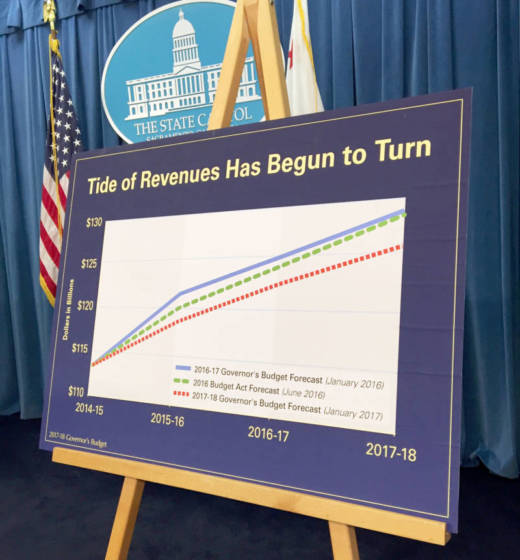"April is usually the state’s biggest tax filing month, so lower-than-expected personal income tax receipts are troubling,” said Controller Betty Yee in a statement. “This is another signal that we may be inching towards an economic downturn."
With long-term revenues falling right in line with his office's forecast, the governor may not be compelled to go along with spending requests from legislative Democrats.
Changes to January Spending Cuts?
With a lack of revenue growth, it's not likely the governor will rescind the cuts he originally proposed in January's $179 billion spending plan. To review: Brown is looking to end the Middle Class Scholarship Program, eliminate a $400 million set-aside for affordable housing from last year's budget, and freeze the planned addition of 3,000 state preschool slots.
Democrats in the Legislature took particular issue with the timing of the proposed cuts, which came after the administration had miscalculated the cost of the state's Medi-Cal program to a tune of $1.5 billion.
State Senate Budget Chair Holly Mitchell told KQED Newsroom that the Senate and Assembly seem united on a number of spending priorities.
"There are some above-the-fold issues resonating with all of us," including child care, health care, and funding for In Home Supportive Services, she said.
Will the Governor Change Course on In-Home Care Reforms?
The January budget proposal came with a dramatic shift in the way the state would fund in-home care for half a million elderly and disabled Californians.
The cost for In Home Supportive Services is currently shared by the state and counties; Brown's proposal would reduce the state's share by around $626 million. The January budget acknowledged that "this change is likely to result in financial hardship and cash flow problems for counties.”
Legislators were critical of that proposal, and an Assembly budget subcommittee went in a different direction, pushing for a plan to reduce the burden for counties, and sending them additional state funds to help with the cost shift.
The Trump Effect
When Brown unveiled his budget plan in January, President Trump had yet to take office, and the governor said there were "too many uncertainties," to realistically plan around federal cuts.
Those "known unknowns" are a bit clearer, one week after a health care plan that would eventually stop the flow of billions of Medicaid dollars to California passed the House of Representatives.
But with little flexibility, and with the federal government still relying on stopgap spending measures, it would be a surprise if the governor were to begin building a budgetary wall against future federal cuts.
